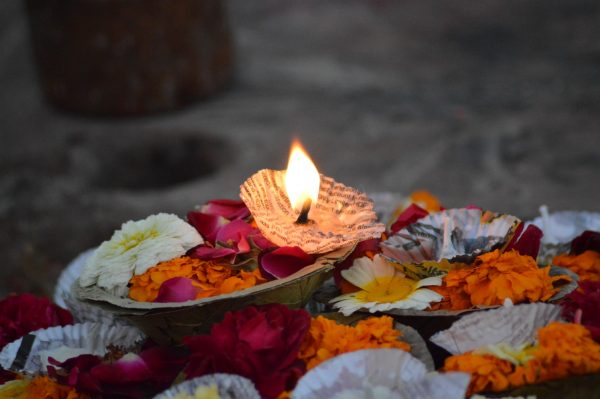Deepavali is the Sanskrit word for ‘row of lights’. More commonly known as Diwali, it is the Hindu, Jain, and Sikh festival of light, which dates back to ancient times, and is mentioned in Sanskrit texts. It is a celebration of the return of Lord Rama, his wife Sita, and his brother Lakshmana, from 14 years of exile after Rama had defeated King Ravana. It is believed that in order to help the three of them to see the path back from the forest, people lit lamps all along it. The lamps symbolised the sun, which is the cosmic giver of light and energy to all life.

During Diwali, people come together in celebration; they wear newly bought clothes, and prepare for the busy few days ahead. They clean and decorate their homes, light candles inside and outside, and visit family and friends for supper. Fireworks light up the skies, and the temples are full of worshippers giving thanks to various deities including Laxmi, goddess of wealth and prosperity (of all kinds), and Lord Ganesh, the remover of obstacles. The themes of this celebration are compassion for others, good over evil, light over darkness, and knowledge over ignorance.The candles remind us of the spiritual inner light that triumphs over darkness, of right over wrong, and of self-inquiry. Diwali asks us to ‘see’ the good in all aspects of our lives. I remember as a child, the air of celebration and joy during Diwali. My parents, siblings and I would spend the time visiting our ‘family’ of friends (our actual relatives were all back in India), and we would take offerings of freshly cooked food and Indian confections, which represent the sweet nature of the occasion, and celebrate love, kindness, and the goodness that abounds.
I have always felt that the symbolism of Diwali and its message is universally applicable and does not require a ‘religious’ leaning from anyone who chooses to embrace it. It is a time for cleaning the mind, clearing negativity and darkness, as well as making time for others, both in our minds and in our lives. Charities are given donations during Diwali, and even the soldiers at the international border between India and Pakistan give each other sweetmeats as a gesture of goodwill. I believe in the inherent goodness of humanity, and sometimes feel we have simply lost sight of the path. We all understand the very things that Diwali represents; not many of us would argue otherwise. But sometimes we do need a reminder from the traditional celebrations that can be found in all religions and cultures, of what is important.
In my Ayurvedic consultations, I too often see clients who have lost sight of themselves, perhaps travelled down a dark path, and become lost and confused. Once we lose clarity in life, we tend to make choices that do not serve us well. So, we may eat the wrong foods, lead a frenetic lifestyle, and choose unhealthy relationships. This state of confusion causes a cascade of events that can see us spiral out of control, and suffer from holistic ill-health. The ancient festival of Diwali is incredibly pertinent today both for individuals, and for society. We can all stop and think about how to use its beautiful message in our own lives. As I reflect on what it means to me, I can see that I am constantly searching for the inner light in others, which has often been dimmed. When I help my clients to regain holistic balance, I light the path that takes them back to the best version of themselves. Once the flame is strong again, and they are free from often years of darkness, hope and belief in the beauty and divinity of life returns.
